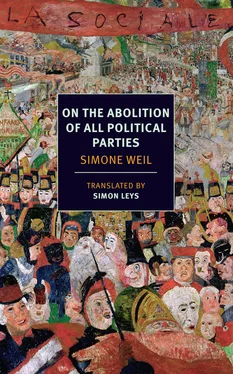Tactless in her writings and completely indifferent to fashions, she was able to go straight to the heart of the matter which preoccupies so many people today. I quote: ‘A man whose whole family died under torture, and who had himself been tortured for a long time in a concentration camp. Or a sixteenth-century Indian, the sole survivor after the total extermination of his people. Such men if they had previously believed in the mercy of God would either believe it no more, or else they would conceive of it quite differently than before.’ Conceive of it how? The solution proposed by Simone Weil is not to the taste of those who worship the goddess of History; it may be heretical from the Thomist point of view as well.
A few words should be said about Simone Weil’s road to Christianity. She was imbued with Greek philosophy. Her beloved master was Plato, read and reread in the original. One can notice a paradox of similarity between our times and the times of decadent Rome, when for many people Plato — that ‘Greek Moses’ as he was sometimes called — served as a guide to the promised land of Christendom. Such was the love of Simone Weil for Greece that she looked at all Greek philosophy as eminently Christian — with one exception: Aristotle, in her words ‘a bad tree which bore bad fruit.’ She rejected practically all Judaic tradition. She was never acquainted with Judaism and did not want to be, as she was unable to pardon the ancient Hebrews their cruelties, for instance the ruthless extermination of all the inhabitants of Canaan. A strange leftist, she categorically opposed any notion of progress in morality, that widely spread view according to which crimes committed three thousand years ago can be justified to a certain extent because men at that time were ‘less developed.’ And she was making early Christianity responsible for introducing, through the idea of ‘divine pedagogy,’ a ‘poison,’ namely, the notion of historical progress in morality. She says: ‘The great mistake of the Marxists and of the whole of the nineteenth century was to think that by walking straight ahead one would rise into the air.’ In her opinion, crimes of the remote past had to be judged as severely as those committed today. That is why she had a true horror of ancient Rome, a totalitarian state not much better than the Hitlerian. She felt early Christians were right when they gave Rome the name of the Apocalyptic Beast. Rome completely destroyed the old civilisations of Europe, probably superior to the civilisation of the Romans who were nothing but barbarians, so skilful in slandering their victims that they falsified for centuries our image of pre-Roman Europe. Rome also contaminated Christianity in its early formative stage. The principle anathema sit is of Roman origin. [3] The only true Christian civilisation was emerging in the eleventh and twelfth centuries in the countries of the Langue d’Oc, between the Mediterranean and the Loire. After it was destroyed by the Frenchmen who invaded that territory from the north and massacred the heretics — the Albigensians — there has not been any Christian civilisation anywhere.
Violent in her judgments and uncompromising, Simone Weil was, at least by temperament, an Albigensian, a Cathar; this is the key to her thought. She drew extreme conclusions from the Platonic current in Christianity. Here we touch perhaps upon hidden ties between her and Albert Camus. The first work by Camus was his university dissertation on Saint Augustine. Camus, in my opinion, was also a Cathar, a pure one, and if he rejected God it was out of love for God because he was not able to justify him. The last novel written by Camus, The Fall , is nothing else but a treatise on Grace — absent Grace — though it is also a satire: the talkative hero, Jean-Baptiste Clamence, who reverses the words of Jesus and instead of ‘Judge not and ye shall not be judged’ gives the advice ‘Judge, and ye shall not be judged,’ could be, I have reasons to suspect, Jean-Paul Sartre.
The Albigensians were rooted in the old Manichaean tradition and, through it, akin to some sects of the Eastern Church of Bulgaria and of Russia. In their eyes God the monarch worshipped by the believers could not be justified as he was a false God, a cruel Jehovah, an inferior demiurge, identical with the Prince of Darkness. Following the Manichaean tradition, Simone Weil used to say that when we pronounce the words of the Lord’s Prayer: ‘Thy kingdom come’ we pray for the end of the world as only then the power of the Prince of Darkness will be abolished. Yet she immediately added that ‘Thy will be done on earth’ means our agreement to the existence of the world. All her philosophy is placed between these two poles.
There is a contradiction between our longing for the good, and the cold universe absolutely indifferent to any values, subject to the iron necessity of causes and effects. That contradiction has been solved by the rationalists and progressives of various kinds who placed the good in this world, in matter, and usually in the future. The philosophy of Hegel and of his followers crowned those attempts by inventing the idea of the good in movement, walking toward fuller and fuller accomplishment in history. Simone Weil, a staunch determinist (in this respect she was not unlike Spinoza), combated such solutions as illegitimate. Her efforts were directed toward making the contradiction as acute as possible. Whoever tries to escape an inevitable contradiction by patching it up is, she affirms, a coward. That is why she has been accused of having been too rigid and having lacked a dialectical touch. Yet one can ask whether she was not more dialectical than many who practise the dialectical art by changing it into an art of compromises and who buy the unity of the opposites too cheaply.
Certainly her vision is not comforting. In the centre we find the idea of the wilful abdication of God, of the withdrawal of God from the universe. I quote: ‘God committed all phenomena without exception to the mechanism of the world.’ ‘The distance between the necessary and the good is the selfsame distance as that between the creature and the Creator.’ ‘Necessity is God’s veil.’ ‘We must let the rational in the Cartesian sense, that is to say mechanical rule or necessity in its humanly demonstrable form, reside wherever we are able to imagine it, so that we might bring to light that which lies outside its range.’ ‘The absence of God is the most marvellous testimony of perfect love, and that is why pure necessity, necessity which is manifestly different from the good, is so beautiful.’
She allows neither the historical Providence of the traditional Christian preachers, nor the historical Providence of the progressive preachers. Does it mean that we are completely in the power of la pesanteur , gravity, that the cry of our heart is never answered? No. There is one exception from the universal determinism and that is Grace. ‘Contradiction,’ says Simone Weil, ‘is a lever of transcendence.’ ‘Impossibility is the door of the supernatural. We can only knock at it. Someone else opens it.’ God absent, God hidden, Deus absconditus , acts in the world through persuasion, through Grace, which pulls us out of la pesanteur , Gravity, if we do not reject his gift. Those who believe that the contradiction between necessity and the good can be solved on any level other than that of mystery delude themselves. ‘We have to be in a desert. For he whom we must love is absent.’ ‘To love God through and across the destruction of Troy and Carthage, and without consolation. Love is not consolation, it is light.’
For Simone Weil, society is as subject to the rule of necessity as all the phenomena of the world. Yet if Nature is nothing but necessity and therefore innocent, below the level of good and evil, society is a domain where beings endowed with consciousness suffer under the heel of an ally and tenant of necessity, the Prince of Darkness. She says: ‘The Devil is collective (this is the God of Durkheim).’ Her stand in politics is summed up in a metaphor she used often, taken from Plato. Plato compares society to a Great Beast. Every citizen has a relationship with that Beast, with the result that asked what is the good, everyone gives an answer in accordance with his function: for one the good consists in combing the hair of the Beast, for another in scratching its skin, for the third in cleaning its nails. In that way men lose the possibility of knowing the true good. In this Simone Weil saw the source of all absurdities and injustices. Man in the clutches of social determinism is no more than an unconscious worshipper of the Great Beast. She was against idealistic moral philosophy as it is a reflection of imperceptible pressures exerted upon individuals by a given social body. According to her, Protestantism also leads inevitably to conventional ethics reflecting national or class interests. As for Karl Marx, he was a seeker of pure truth; he wanted to liberate man from the visible and invisible pressures of group ethics by denouncing them and by showing how they operate. Because of that initial intention of Marx, Marxism is much more precious for the Christians than any idealistic philosophy. Yet Marx, in his desire for truth and justice, while trying to avoid one error fell into another which, argues Simone Weil, always happens if one rejects transcendence, the only foundation of the good accessible to man. Marx opposed class-dominated ethics with the new ethics of professional revolutionaries, also group ethics, and thus paved the way for a new form of domination by the Great Beast. This short aphorism sums up her views: ‘The whole of Marxism, in so far as it is true, is contained in that page of Plato on the Great Beast; and its refutation is there, too.’
Читать дальше












